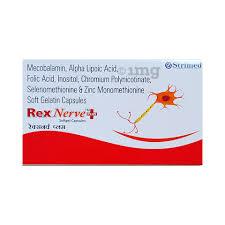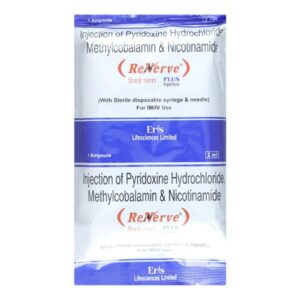NICOTINAMIDE + PYRIDOXINE HCI + METHYL COBALAMIN
Nicotinamide: Nicotinamide, also known as niacinamide or nicotinic acid amide, is a form of vitamin B3. It is an essential nutrient that plays a critical role in various metabolic processes in the body.
Nicotinamide is primarily used as a supplement to treat and prevent niacin deficiency, a condition that can lead to a condition called pellagra. It is also used in the treatment of certain skin conditions, such as acne and rosacea.
The exact mechanism of action of nicotinamide is not fully understood, but it is believed to work by promoting the synthesis of nicotinamide adenine dinucleotide (NAD+), a coenzyme involved in a wide range of cellular processes. NAD+ is essential for energy production, DNA repair, and maintenance of cellular homeostasis.
The recommended daily dose of nicotinamide varies depending on the specific condition being treated. For the prevention and treatment of niacin deficiency, a typical dose ranges from 50 to 500 mg per day. For skin conditions, doses of 500 to 1500 mg per day may be recommended, but it is important to consult a healthcare professional for the appropriate dosage.
Nicotinamide is generally considered safe when taken at recommended doses. It is well-tolerated and rarely causes significant side effects. Common side effects, when they occur, may include mild gastrointestinal symptoms such as nausea and diarrhea. Rarely, high doses of nicotinamide may cause liver toxicity, so regular monitoring of liver function is recommended during prolonged use.
Overall, nicotinamide is a valuable nutrient and medication used for its various benefits. It is important to follow the recommended dosage and consult a healthcare professional before starting any supplements or medications.
Pyridoxine Hci: Pyridoxine HCl, also known as vitamin B6, is a water-soluble vitamin that plays a crucial role in various bodily functions. It is commonly available as an over-the-counter supplement and is also present in many foods.
Pyridoxine HCl is used primarily to treat or prevent vitamin B6 deficiency, which can occur in certain medical conditions such as kidney disease, malabsorption disorders, or alcoholism. It may also be prescribed for other conditions such as nausea during pregnancy or as a supplementary treatment for seizures in certain epilepsy patients.
The mechanism of action of Pyridoxine HCl involves its conversion into its active form, pyridoxal 5′-phosphate (PLP), in the body. PLP acts as a coenzyme for numerous enzymatic reactions involved in protein metabolism, neurotransmitter synthesis, hemoglobin formation, and immune function. By aiding in these processes, pyridoxine HCl contributes to the maintenance of a healthy nervous system, normal brain development in infants, and overall cellular function.
The recommended dose of Pyridoxine HCl depends on the specific condition being treated and should be determined by a healthcare professional. However, for most adults, the typical oral daily dose ranges from 1 to 2 mg. Higher doses may be needed for certain conditions, but it is important not to exceed the recommended dose unless directed by a healthcare provider.
While Pyridoxine HCl is generally considered safe when taken as directed, it may cause some side effects. Common side effects include nausea, headache, drowsiness, numbness or tingling in the extremities (peripheral neuropathy), and sensory neuropathy symptoms such as burning or shooting pain. Prolonged use of high doses may result in severe sensory neuropathy, although this is rare.
It’s important to note that Pyridoxine HCl may interact with certain medications, such as levodopa (used to treat Parkinson’s disease), phenytoin (an anti-seizure medication), and some antibiotics. It’s always recommended to consult with a healthcare professional or pharmacist before starting any new medication or supplement.
Methyl Cobalamin: Methylcobalamin is a form of vitamin B12 that can be used as a dietary supplement or as a prescription medication. It is available in oral tablets, sublingual tablets, lozenges, and injectable forms.
Methylcobalamin is primarily used to treat vitamin B12 deficiency, which can occur due to various reasons such as poor absorption, inadequate dietary intake, or certain medical conditions. It is essential for the formation of red blood cells, maintenance of nerve function, and DNA synthesis.
The mechanism of action of methylcobalamin involves its conversion to an active form of vitamin B12 in the body called methylcobalamin, which is necessary for the proper functioning of enzymes involved in various metabolic pathways. It helps in the conversion of homocysteine to methionine, which is important for the production of DNA, RNA, and proteins.
The recommended dose of methylcobalamin may vary depending on the patient’s condition and the form of the medication. For vitamin B12 deficiency treatment in adults, typically 1,000 to 2,000 mcg of oral methylcobalamin per day is recommended. In certain cases, higher doses or injectable forms may be needed.
Methylcobalamin is generally considered safe and well-tolerated. Common side effects may include mild diarrhea, nausea, headache, or itching at the injection site (if administered via injection). These side effects are usually temporary and resolve on their own. Allergic reactions to methylcobalamin are rare, but if any serious allergic symptoms occur (difficulty breathing, swelling of the face or throat, rash), immediate medical attention should be sought.
It is important to consult a healthcare professional before starting methylcobalamin, as it may interact with certain medications or medical conditions. Additionally, long-term and high-dose use of methylcobalamin should be done under medical supervision to monitor for potential side effects or complications.



